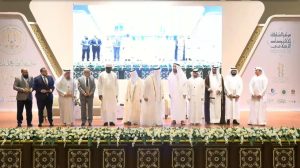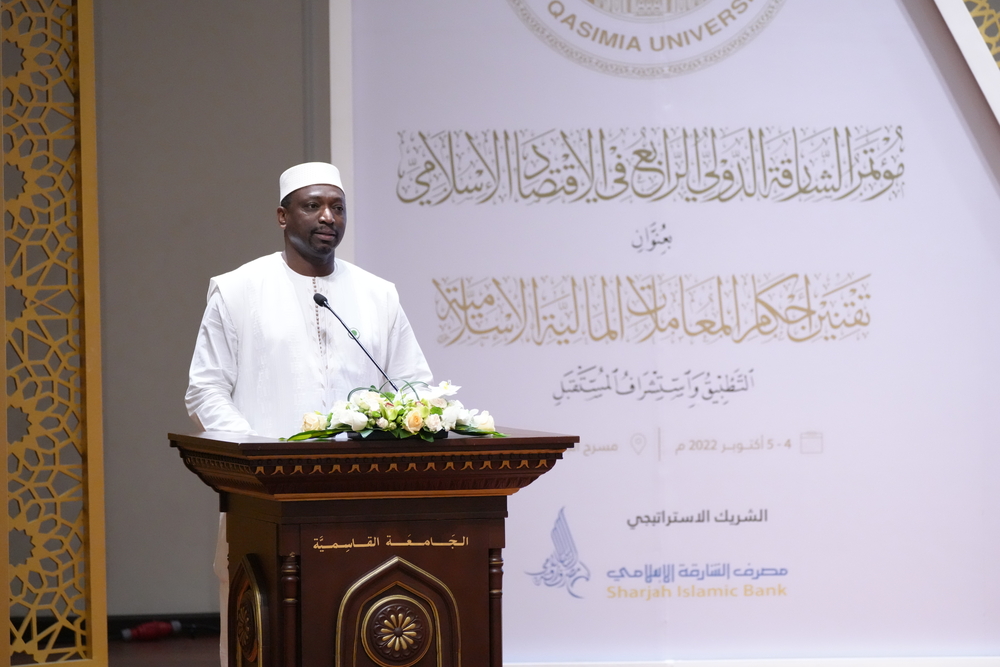
His Excellency Prof. Koutoub Moustapha Sano, Secretary General of the International Islamic Fiqh Academy (IIFA), participated in the Fourth Sharjah International Conference on Islamic Economy entitled “Codifying the Provisions of Islamic Financial Transactions: Application and Future Foresight” on Tuesday and Wednesday 8 and 9 Rabi’ al-Awwal 1444H corresponding to 4 and 5 October 2022G, held under the patronage of His Highness Sheikh Dr. Sultan bin Muhammad Al Qasimi, Member of the Supreme Council and Ruler of Sharjah, and organized by the Sharjah Center for Islamic Economics at Al Qasimia University in the Emirate of Sharjah, United Arab Emirates.
This important international conference aims to identify the criteria for the success of codifying the provisions of Islamic financial transactions, presenting contemporary local and international practices and experiences in codifying the provisions of Islamic financial transactions, and the most important Shariah and legal problems for codifying the provisions of Islamic financial transactions and their solutions, as well as the role of artificial intelligence and digital applications, and the impact of codifying on the prosperity and growth of the Islamic financial industry. The conference hosted local and international academic and professional experts with extensive experience in this field, to talk about the scientific themes of the conference, and to come up with recommendations that would have a positive impact on the progress and prosperity of the Islamic financial industry.
His Excellency the Secretary General of the Academy delivered a keynote during the opening session, in which he expressed his thanks and appreciation to the Emirate of Sharjah, the Emirate of science, knowledge, culture and heritage, and its ruler, His Highness Sheikh Dr. Sultan bin Muhammad Al Qasimi, Member of the Supreme Council of the United Arab Emirates, for the generous of the care he gives to science and scholars, asking God to preserve His Highness and his brothers the rulers of the Emirates, and to perpetuate upon them and the honorable Emirati people the blessing of security, safety, stability and prosperity. His Excellency also expressed his thanks and gratitude to Al Qasimia University and its management, president, director and faculty members for their good selection of the topic of this conference, and the good preparation for it in terms of planning, organization and implementation.
Then His Excellency touched on the topic of the conference on codifying the provisions of Islamic Fiqh saying: “The choice of the ruler, or whoever delegates him, of Fiqh rulings related to one of the five pillars of Islamic Fiqh (worship, marriages, transactions, criminal justice, governance), and the classification of those selected rulings based on a significant temporal interest, then formulating it in brief terms and codifying it in the form of arranged, numbered and classified legal articles that is no more than a type of ijtihad desired in this era, just as it is no more than a form of renewal desired in our contemporary reality, in order to prevent what we see today from contradictions and inconsistencies in the applications of many financial transactions in Islamic financial institutions. It is this ijtihad and innovation that is known today as codifying.” His Excellency added, “The ijtihad regarding codifying the provisions of financial transactions has become today a religious obligation, and consolidating its rulings has become a modern necessity in the same way as directing its issues, settling its developments and rationalizing its variables has all become a temporal interest, and all of this is in order to preserve the supreme purposes of Shariah in money and business, which are the goal of justice, the goal of circulation, the goal of development, the goal of clarity, and the goal of stability”.
His Excellency mentioned that our universities and intellectual centers constantly organize many conferences, forums and symposia in search of effective solutions to the problems of contemporary life, and in the hope of finding satisfactory answers to the many and varied challenges facing the Muslim Ummah, stressing that this conference “comes within the framework of transferring the issue of codifying from the realm of theory to the realm of practice, and from the realm of wishes to the realm of possibilities, by highlighting the foundations and pillars on which the codification of the provisions of contemporary financial transactions should be based in order to preserve the purpose of the order of the Ummah represented in the cohesion of its social fabric by strengthening its intellectual unity, consolidating its social solidarity, and unifying its visions in its directions and its relations, as well as strengthening its economic and developmental status. This great purpose requires the necessity to stay away from every thought or behavior that results in the occurrence of conflict, contention, hatred and contradiction in the society, and the requirement of this purpose is that harmony and concord prevail among the members of the society, and the quarrel and clash disappears”.
In conclusion, His Excellency expressed his hope that the conference would issue solid, mature and comprehensive recommendations that include clear lines and sound foundations that help achieve the long-awaited codification, as it will bring about effective solution that regulates contradictory applications in the field of the contemporary financial industry, and conflicting and incompatible applications of the provisions of transactions that are supposed to be harmonious, compatible and matched.
It is worth noting that His Excellency the Secretary General of the Academy was honored during the opening ceremony by the conference organizers. His Excellency also participated as a speaker in the first main discussion session in the conference, accompanied by His Excellency Sheikh Abdullah bin Suleiman Al-Manea, member of the Council of Senior Scholars and Advisor at the Royal Court, Dr. Ahmed bin Abdelaziz Al-Haddad, Chairman of the Supreme Shariah Board for Islamic Banking Financial Activities at the Central Bank of the Emirates, and Professor Dr. Muhammad Ali Al-Qari, expert in the International Islamic Fiqh Academy, and moderated the session Dr. Osaid Kilani, member of the Supreme Shariah Board for Islamic Banking Financial Activities at the Central Bank of the Emirates.

Read Also
Lastest








